He said ‘Shelock’: The Merchant of Venice Revisited
Tracy-Ann Oberman and Howard Jacobson discuss the play, its problems and prejudices
Tracy-Ann Oberman and Howard Jacobson have always been less than comfortable with The Merchant of Venice. With the actress and writer poised to play the first female Shylock next year, we invited her to a discussion with the eminent novelist and Shakespeare specialist. They met on a summer evening in a Soho loft .
Prologue to Act One: Tracy-Ann Oberman (TAO) catches sight of Howard Jacobson’s (HJ) ring.
TAO: What is that?
Get The Jewish News Daily Edition by email and never miss our top stories Free Sign Up
HJ: It is the turquoise, it is Shylock’s turquoise ring. It is my favourite line in the whole play, when Shylock says “It was my turquoise. I had it of Leah when I was a bachelor. I would not have given it for a wilderness of monkeys” — this is when he learns that his daughter, Jessica, has stolen it, sold it, and bought a monkey with the proceeds. My wife, Jenny, knew I loved this line and bought me the ring.
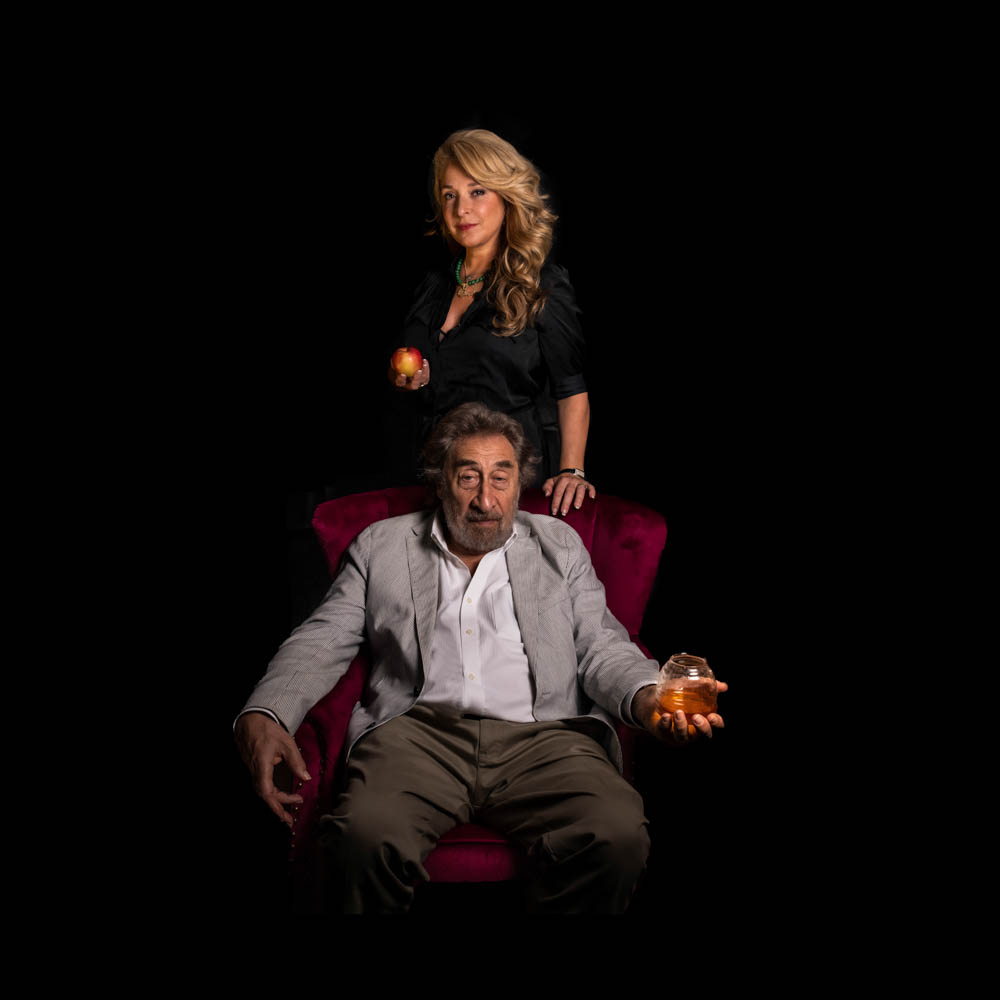 Act One, scene one: First Encounter
Act One, scene one: First Encounter
JF: Howard, this was a play you had never taught. And both of you have done very different takes on The Merchant of Venice. Can you share your experiences?
TAO: I’m performing in The Merchant of Venice 1936. I’ve been working with Brigid Larmour, artistic director of the Watford Palace, to cut it down and reframe it, still using the original text, but with other elements added in.
JF: Let’s go back to first principles. What did you dislike about the play, for all those years before you started to write?
HJ: That initial discomfort was a teenage boy’s discomfort. I was 14 and we were reading The Merchant of Venice in class, and the teacher said, ‘Jacobson, you’re Shylock’. Right away, I thought, I wonder why? I was not made uncomfortable because I thought it was antisemitic. I thought it was too philosemitic. It was the famous speech — “Hath not a Jew eyes?” I was acting Shylock, and I did not want to hear myself, or him, making that plea for Jews.
I thought, well, this is not the Shakespeare I’m interested in, this felt like a special interest thing. It’s not what Shakespeare normally does. I didn’t like it.
It was only when I was asked to write my own take on the Merchant [his 2016 novel, Shylock is My Name] that I remembered I’d not liked the play and had never taught it. But I said, okay, let me take a look and the minute I did, it was not the play I remembered. It was entirely different. I started to get into its world of self-pitying Gentiles, of loathsome, self-delighting, whingeing, moaning and whining, wheedling Gentiles, who were also, very quickly, antisemites. I thought, this is good stuff. This is fun. And this gives me an opportunity to say that anybody who says the play is antisemitic does not know how to read it! It’s not without its problems, there are always problems in Shakespeare, because he’s complex; but it was clear to me that this was a play about antisemitism as a subject. But it was no more promoting antisemitism than Macbeth promotes the murder of Scottish kids.
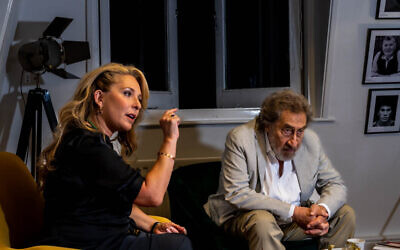 TAO: My first experience with the play was very similar to Howard’s. We were reading it at school and I found it a really uncomfortable experience, mainly because of the laughter and the sort of baying at [Shylock’s words] “my ducats, my daughter”.I’ve never seen a production that sat easily with me, for many reasons. I don’t know whether the laughter, the hatred, or the pity, is worst. I find it a problematic play, because, as Howard says, it’s misunderstood. But I also think it ties in with antisemitic Jewish tropes in this country that go all the way back to medieval times and carry on today.
TAO: My first experience with the play was very similar to Howard’s. We were reading it at school and I found it a really uncomfortable experience, mainly because of the laughter and the sort of baying at [Shylock’s words] “my ducats, my daughter”.I’ve never seen a production that sat easily with me, for many reasons. I don’t know whether the laughter, the hatred, or the pity, is worst. I find it a problematic play, because, as Howard says, it’s misunderstood. But I also think it ties in with antisemitic Jewish tropes in this country that go all the way back to medieval times and carry on today.
So when I approached it, I wanted to see how the play would change if you made Shylock a widowed single mother, with a daughter. I was thinking about the toughness of Shylock. I wondered what would happen if you set it in the 30s, and I based it on my bubbeh, and the tough Jewish women who had come here from Belarus, or the Pale of Settlement, and were so alien in this English world. Back then a Jewish woman had to be able to strap a cow across her back while ideally her husband was a Talmud scholar. She’d have 14 children, but made her hovel look like a palace on Shabbat. She could survive rapes, beheadings, Cossack attacks, her sons being taken into the Russian army. These women were survivors, but to the aristocratic British, these tough balabustehs were seen as unfeminine.
In my personal experience of standing up to antisemitism, I found a real intersectionality between misogyny and antisemitism which also made me think, what happens if you have a female Shylock? What if it is set in 1936, just before the Battle of Cable Street? What happens if you make Portia a sort of more intelligent Nancy Mitford? And what happens if these [Christians] are awful, Oswald Mosley acolytes, like the Bullingdon Boys, gone wrong?
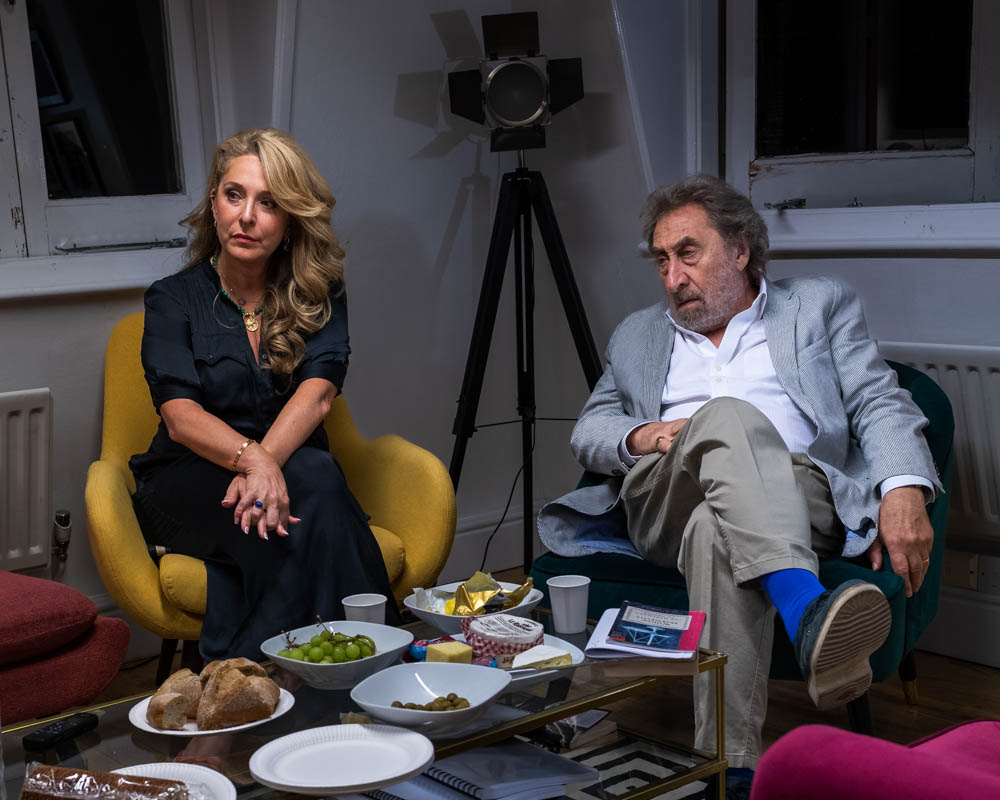 Scene two: Shylock as a She
Scene two: Shylock as a She
HJ: So is your female Shylock having an even worse time? Because she’s not just a Jew, but a woman?
TAO: Yes. But what I found quite liberating is that whereas in other productions I’ve seen there’s a nobility to Shylock and a victim-like status, I’ve managed to get rid of all of that.
She’s tough and she’s horrible, because she has to be tough and she has to be horrible. People had assumed I’ve made her terribly noble and that Shylock is going to be the heroine. On the contrary, it’s made me embrace what makes somebody think— if you want a monster, I’ll give you a monster. So she is really difficult, and tough.
I had a great-aunt, known as Machine-Gun Molly, and another in the East End called Sarah Portugal, who had bright red lipstick and smoked a pipe. These women were widows, and the men were absolutely terrified of them, because they were tough-as-nails negotiators. They had to be tougher than the men.
HJ: So is it you saying “you want a monster and I’ll give you a monster”, or was it the Jewish women who said, “Okay, you want to see us as monsters? We’ll show you that.”
Because I think Shylock does that. The Shylock that Shakespeare gives us is someone who says, “I will play up to this version of me. It does me no good to do this. But it gives me a satisfaction, because it allows me to deride you and to sneer at your incapacity to treat me as a human being. And I will prove that more, by being this less-than-human being”.
Scene three: The psychology
TAO: There’s a moment where my Shylock wants to befriend the Christian traders, Antonio and Bassanio. She tries to show them she is more than just this woman who may or may not lend money. It’s almost like she’s saying, look, I’m intellectual, I read, I understand the Talmud and I’m more than what you see here.
 HJ: [And actually, Shylock says] “I’m more than you, because you’ve read nothing, you know nothing”. He dances rings around Antonio and Bassanio. They don’t know what to do with him. Maybe in making Shylock a woman, you might be able to give this another edge. He flirts, with that stuff about taking the pound of flesh “from … the part that pleases me most”.
HJ: [And actually, Shylock says] “I’m more than you, because you’ve read nothing, you know nothing”. He dances rings around Antonio and Bassanio. They don’t know what to do with him. Maybe in making Shylock a woman, you might be able to give this another edge. He flirts, with that stuff about taking the pound of flesh “from … the part that pleases me most”.
TAO: And she flirts with Bassanio. But when he brings Antonio [to see Shylock], he’s playing two different games, which is sort of ok with a Jew, but deeply uncomfortable for his aristocratic friends.
But it turns for me, in the Leah ring moment —when I say “my husband gave it to me”. And then she comes back and finds her daughter gone. She finds it was all bullshit. They [the Christians] have taken everything.
HJ: Well, that’s the moment when the deal ‘the taking of the pound of flesh’, which was some kind of a joke, and we don’t quite know what kind, suddenly becomes serious.
You suddenly know the problems that Shylock has bringing up his daughter, as a single father. This is what Shakespeare does, in one line. This man’s past is given to you, the degree of feeling is given to you. That’s why for me, it can’t be an antisemitic play, because antisemites do not see the human being in the person that they are rude to.
TAO: I do think it’s an antisemitic play. Jews hate blood. It is not in our culture. The blood libel is so offensive because we don’t eat meat with blood. So this idea of Shylock taking the flesh, and being told “thou shall not take a single drop of Christian blood” carries on the blood libel.
Scene four: The money-lender’s future
Stage directions: Everything is taken from Shylock when he loses the court case because he is unable to take Antonio’s flesh without drawing blood. As a result he has to forfeit half his wealth to Antonio and the rest to the Venetian state. But there is one more turn of the screw when Antonio insists that Shylock should also convert to Christianity.
JF: What do you think becomes of Shylock? In the play Shakespeare gives him the line “I am content”. In other words, he accepts the verdict and is ready to become Christian. In Howard’s novel, Shylock says, well, we don’t know what happens because “the story stopped”. Howard tells the reader, I’m not going to say Shylock does convert. Tracy-Ann, what does your Shylock do?
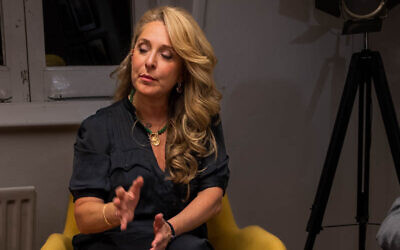 TAO: Shylock’s life is destroyed, his religion, his money, everything he needs to survive is taken away from him… It was very important to me that after the court scene, you see Shylock again. But because we’ve set it against the backdrop of the Battle of Cable Street, there’s another element to this, which is you’ve taken a woman who’s surviving, and gradually we’re politicising her to get to the point where Cable Street means something.
TAO: Shylock’s life is destroyed, his religion, his money, everything he needs to survive is taken away from him… It was very important to me that after the court scene, you see Shylock again. But because we’ve set it against the backdrop of the Battle of Cable Street, there’s another element to this, which is you’ve taken a woman who’s surviving, and gradually we’re politicising her to get to the point where Cable Street means something.
JF: I could not conceive of any circumstance under which your Shylock would join the Christians as represented by the British Union of Fascists.
TAO: Well, we don’t know what happens to Shylock, we just know that he/she has been broken. They’ve tried to destroy her — but Jews have faced worse and they do survive.
HJ: I think it’s fair enough to give Shylock an extra appearance, because I think “I am content” is mystifying. I never want to say Shakespeare got it wrong. I always want to say he got everything right. But I don’t get “I am content”. I get that he may have decided Shylock will leave, completely broken by what these heartless swine, who dare to talk of mercy, have done to him. But who gave them the idea of mercy anyway? They got it from Jesus and Jesus got it from the Jewish religion.
I can see a defeated Shylock, but why he would say “I am content”? I don’t know how to explain that. So, give us another ending, fine. I decided I wanted something else. Certainly my Shylock is not content. My Shylock is alive now, in the present, and boiling with rage, he isn’t capable of contentment. He has nothing but contempt for the Christian world and its treatment of him.
Scene five: the obsession with Jews
TAO: I looked into Mosley, and he had his big rallies, including one at the Royal Albert Hall. All the aristocracy came and heard Mosley’s ideas about Jews —the aristocracy bloody loved it. But when he got to Earls Court, he cocked up. Mosley had these trained boxers, called the “biff-boff boys”, but some Jews had infiltrated and before Mosley could speak for more than three seconds, they kept putting up their hands to ask questions. Mosley couldn’t contain his anger and gave the nod to the biff-boff boys to beat up the Jews. And that’s when the aristocracy said, gosh, he’s right about the Jews, but we don’t like this violence.
This is the world my Shylock exists in…When I heard my bubbeh, my grandma and great-uncles talking about what they did at the Battle of Cable Street, these were fighting, surviving, Jews. I wanted to remind people of that.
HJ: The world you’re describing is worse than the world of the Merchant of Venice.
TAO: But there was a ghetto in Venice in which Jews had to live where their rights were inhibited.
HJ: But there’s no ghetto in Shakespeare’s Venice. Remember, he knew almost nothing about Jews. There were none in Elizabethan England.
The mystery is why the Elizabethans were so interested in Jews and in plays that traduced Jews such as Marlowe’s The Jew of Malta when there are no Jews there?
TAO: It was ever thus. We are a tiny community, and yet we fill headspace and column inches and social media feeds. People are obsessed. Why are they so obsessed?
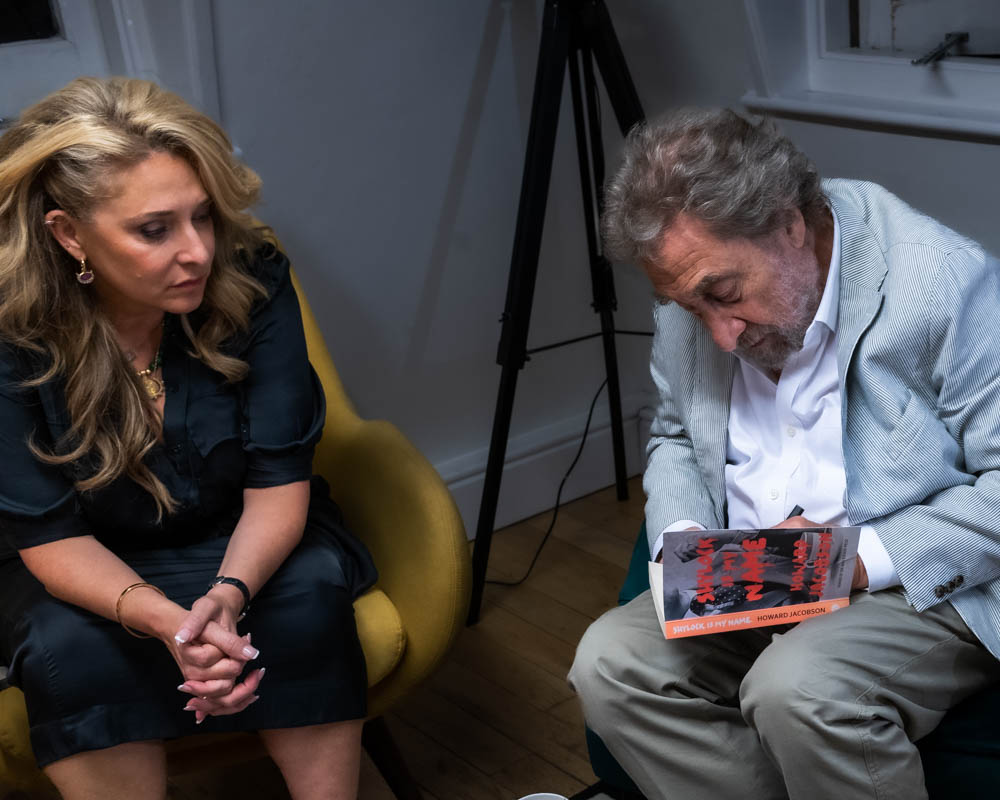
Act two, scene one: the meaning of the pound of flesh
HJ: What did occur to me when I was writing this book, was that the pound of flesh is actually a version of circumcision. I remember a TV programme I did about Shylock, and interviewing [Shakespeare scholar] James Shapiro. And I said to him, I’ve got this idea. Do you think this is mad? Shakespeare isn’t saying Shylock is circumcising Antonio, but somewhere, [perhaps] in what he would have read, he would have come across misunderstandings of circumcision.
JF: I think it might have been castration, rather than circumcision.
HJ:They didn’t know the difference. The Christians thought circumcision was castration.The blood libel comes partly from the belief that Jewish men needed Christian blood, to replenish their own blood, because they bled all the time. Part of what terrified Christians about Jews was that if Jews circumcised themselves, what would they do to us?
TAO: My Shylock has a history of [being the target of] misogyny, mistrust and hatred, So for her, when she says to Antonio, “you call me cutthroat, dog and cur”, it really has a resonance. It really ties into my own experience of misogyny and antisemitism and tropes about Jewish women.
Act Two, scene two: ingrained antisemitism
HJ: I saw a production recently that wasn’t particularly sympathetic to Shylock. And the audience hissed at him. It was impossible to see what they were hissing at in the production. Quite a young audience, it was spontaneous, almost as if Shylock had come out of pantomime.
But what the play show is the depth of antisemitism. It’s just there. In the play Shylock says to Antonio, you called me dog before you knew me. Now I will show you my fangs. It reminds you of how ingrained antisemitism is in the Christian imagination.
TAO: One of the things I hadn’t fully appreciated was how deep antisemitism goes in this country, though the British like to think of themselves as incredibly tolerant. The idea of the Jewish moneylender, of the Jew being obsessed with money, “my ducats, my daughter”, was an English construct. The Jews did lots of different things in medieval times, but this idea of them being greedy, shifty, not to be trusted and close to power just took over.
And then to have Shylock, Fagin and the Jew of Malta as the three archetypes in literature, it’s so unpleasant, so shameful. People don’t understand antisemitism. It is absolutely alive and kicking. The only thing is, these days it has an acceptable form because they call it anti-Zionism.
HJ: That’s antisemitism on the cheap. In Lithuania, they have a devil museum. I filmed it once. They’re all Jews. To the medieval mind, the Jew was terrifying because he was in cahoots with the devil. He smelled like the devil. Never forget there was a Jewish stench. It was the stench of hellfire.
In Lithuania they also have this wonderful expression, if you put something on inside out, it’s called “going Jew”. It’s not even thought about. I know, no antisemitism is meant, it’s just an expression. But what’s deeper in our culture than its language? Is the idea that anything that’s the inverse of the natural, and the inverse of the normal, is a Jew? How the hell do you get rid of that?
Roots Shmoots was a three-part film, I made with my wife Jenny. We had a very nice, non-Jewish cameraman, who went through Israel with us and then Lithuania listening to it all. At the end when we had our final dinner, he said, ‘it’s been so interesting, to learn and to understand the basis of antisemitism’ And then he said, ‘there’s one question that keeps nagging at me, why are Jews so interested in money?
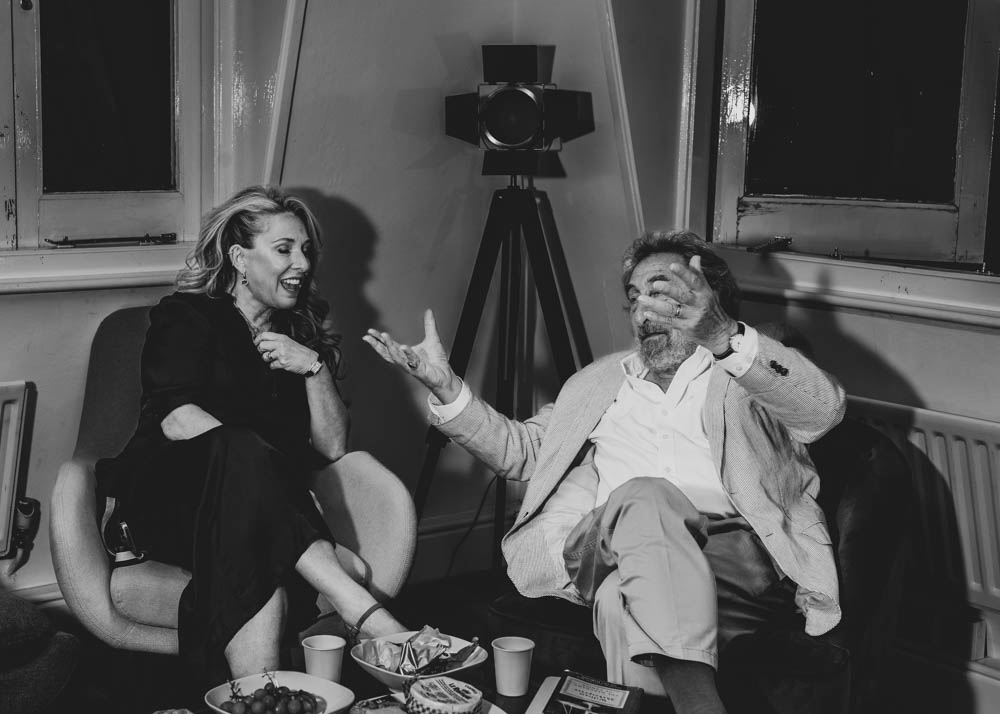
Epilogue
JF: With Rosh Hashanah and Yom Kippur approaching, do you think The Merchant of Venice teaches us anything about atonement?
HJ: Shylock does not atone, but then he hasn’t got anything to atone for. None of the Gentile world in The Merchant of Venice is interested in atonement. They [also] don’t think they have anything to atone for. I think it’s an atonement-free play.
You could say that in the play, Shakespeare atones for the antisemitism of his age, because although there’s lots of ugly stuff about Shylock’s Jewishness, I also think Shakespeare, with the imagination of a supreme artist, becomes interested in Shylock as an individual. His natural instinct is to go towards the person whom ordinary mankind despises, because he is not himself, ordinary mankind. Shakespeare makes him human and to make a person, who is the object of prejudice human is an extraordinary thing.
TAO: For me, Shakespeare cannot help but be influenced by the antisemitism of the day which he was brought up with, like all Englishmen. But I would flip that and say he is writing a play about a loathsome Jew, but because he’s such a great writer, gives that character humanity.
HJ: But the minute you give a character, humanity, you’ve rescued that character from the prejudice.
TAO: And isn’t that because he’s such a great writer? Not because he’s doing it as pro-Jewish?
HJ: Doesn’t matter. What makes a great writer is that imaginative leap into what it is to be somebody else. An absolute antisemite cannot make that leap, but if he/she did, they would cease to be an antisemite.
JF: Your hopes for the new year?
TAO: That people buy tickets to my play. And health. I hope people can afford to heat their homes and eat, that sort of broader scale. I hope for better times to come.
HJ: We do live in the most horrible world that I’ve ever lived in. These are horrible, horrible times. And you would wish therefore for very simple things: you’d want Ukraine to win, for the cost of living to come down. I want inflation to be reduced. I want to finish my next novel.
Photos by Adam Soller

Thank you for helping to make Jewish News the leading source of news and opinion for the UK Jewish community. Today we're asking for your invaluable help to continue putting our community first in everything we do.
For as little as £5 a month you can help sustain the vital work we do in celebrating and standing up for Jewish life in Britain.
Jewish News holds our community together and keeps us connected. Like a synagogue, it’s where people turn to feel part of something bigger. It also proudly shows the rest of Britain the vibrancy and rich culture of modern Jewish life.
You can make a quick and easy one-off or monthly contribution of £5, £10, £20 or any other sum you’re comfortable with.
100% of your donation will help us continue celebrating our community, in all its dynamic diversity...
Engaging
Being a community platform means so much more than producing a newspaper and website. One of our proudest roles is media partnering with our invaluable charities to amplify the outstanding work they do to help us all.
Celebrating
There’s no shortage of oys in the world but Jewish News takes every opportunity to celebrate the joys too, through projects like Night of Heroes, 40 Under 40 and other compelling countdowns that make the community kvell with pride.
Pioneering
In the first collaboration between media outlets from different faiths, Jewish News worked with British Muslim TV and Church Times to produce a list of young activists leading the way on interfaith understanding.
Campaigning
Royal Mail issued a stamp honouring Holocaust hero Sir Nicholas Winton after a Jewish News campaign attracted more than 100,000 backers. Jewish Newsalso produces special editions of the paper highlighting pressing issues including mental health and Holocaust remembrance.
Easy access
In an age when news is readily accessible, Jewish News provides high-quality content free online and offline, removing any financial barriers to connecting people.
Voice of our community to wider society
The Jewish News team regularly appears on TV, radio and on the pages of the national press to comment on stories about the Jewish community. Easy access to the paper on the streets of London also means Jewish News provides an invaluable window into the community for the country at large.
We hope you agree all this is worth preserving.
-
By Brigit Grant
-
By Laurent Vaughan - Senior Associate (Bishop & Sewell Solicitors)
-
By Laurent Vaughan - Senior Associate (Bishop & Sewell Solicitors)
-
By Laurent Vaughan - Senior Associate (Bishop & Sewell Solicitors)
-
By Laurent Vaughan - Senior Associate (Bishop & Sewell Solicitors)






















